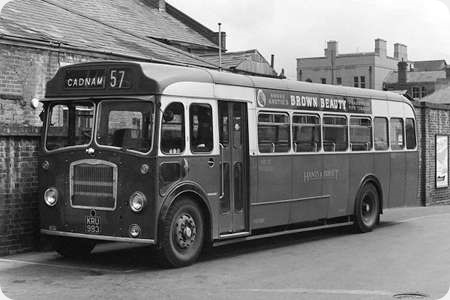
Hants & Dorset Motor Services
1952
Bristol LL5G
ECW FC37F
KRU 993 came to Hants & Dorset in February 1952 as a standard half cab LL6B with an ECW B39R body, one of a batch of seven similar vehicles, KRU 988-994, fleet nos. 782-788, delivered between September 1951 and February 1952. In June 1955 the Bristol AVW engine in KRU 993 was replaced by a Gardner 5LW, making the vehicle an LL5G, a conversion that had happened surprisingly earlier in October 1952 to KRU 990, and to KRU 991 in February 1953. It would seem that the other four retained their Bristol engines. Between September 1959 and July 1960 six of these buses were rebuilt by the operator to full fronted FB39F configuration for OPO operation, with KRU 992 being the last to be so treated in January 1962, but this had the lesser capacity of FB37F. All the others had their seating reduced to 37 in the years 1961 to 1966. The frontal treatment of the conversions ranged considerably from the plain appearance illustrated by KRU 993 through a variety of front panel designs, some bearing the more flamboyant ECW “coach” style radiator grille. KRU 993 is pictured in Southampton in 1962 when it was still a 39 seater, the reduction by two seats occurring in November 1964. 787 was was the first of the batch to be withdrawn in January 1967 when it passed to a dealer. The rest were sold out of service in the following year. I acknowledge the //www.bristolsu.co.uk and the Local Transport History Library websites as sources for much of this history.
Photograph and Copy contributed by Roger Cox
03/05/21 – 07:11
I assume the motive behind these engine swaps was to obtain 6-cylinder units for use in 5LW-engined K-types. The problem which BT&CC and presumably H&D found with the arrival of the KSWs with their higher power was that where older lower powered vehicles were mixed in with them they had difficulty keeping to time – hence taking 6-cylinder engines out of single deckers to use in the double deckers.
Various other interesting features on H&D 787; the kerb view window similar to the SC type, the usual H&D sun-visor. This would also have had the pedestal type drivers seat with a catch released by a foot pedal allowing the seat to rotate so the driver could face the passengers to issue tickets. I always wondered about the safety aspects of these; what was to stop the seat going walkabout while on the move if it failed to catch when returned to the driving position?
Peter Cook
29/05/21 – 07:39
Far better looking than the leering toothy-grin radiator grille that marred so many other L rebuilds.
Ian Thompson
Leave a Reply